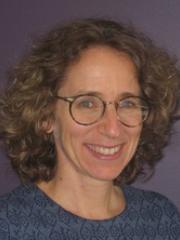Professor Kate Stacey
Laboratory: Innate Immunity Laboratory

Primary research interest
Innate immune cell activation and inflammatory pathology
About me
I research and teach in the field of immunology, specialising in activation of innate immune cells and the resulting cell death and inflammatory pathways. I am also the School Director of Research for SCMB.
Research focus
Responses of the innate immune system to pathogen molecules
One of the most fundamental issues in immunology has been "self/non-self discrimination" - how does the immune system distinguish self from foreign and know what to attack? The last 20 years has seen an explosion of information on how cells identify the presence of invading organisms. This principally involves cells of the innate immune system, which subsequently activate the acquired immune system (T and B cells). “Pattern recognition receptors” (PRR) on innate immune cells bind to characteristically foreign molecules which are conserved amongst groups of pathogens. These foreign molecules are called "pathogen associated molecular patterns” (PAMPs).
The bacterial cell wall provides many PAMPs for recognition of bacterial infection, such as lipopolysaccharide, peptidoglycan, lipoproteins and flagellin. Detection of viral infection is more challenging, as viruses have diverse molecules and can evolve rapidly to evade detection. However, all viruses carry nucleic acids, and these are key to the initiation of anti-viral responses. Whilst beneficial in helping to combat infections, these responses also lead to inflammatory pathology. Furthermore, the same receptor systems respond to certain host molecules that indicate stress and danger, and are thought to drive inflammation in a wide range of diseases of ageing such as Alzheimer's disease, diabetes and heart disease.
The broad theme of my laboratory is innate immune cell recognition of pathogen or "danger" molecules, the responses generated, and their role in pathology. In the past I have been particularly interested in responses of cells to foreign nucleic acids. This started with our early publication of macrophage activation by extracellular bacterial DNA, now known to be mediated by Toll-like receptor 9 (TLR9). On the other hand, DNA in the cytosol of cells is detected as abnormal, and we found this caused macrophage death. Subsequently, we were one of the groups describing the AIM2 inflammasome, a large protein complex that mediates DNA-dependent cell death and inflammation.
We currently focus on Toll-like receptor 4 (TLR4) which is the receptor for bacterial LPS, inflammasome responses, novel responses to cytosolic DNA, as well as inflammatory processes in dengue virus pathology. In-depth understanding of these processes will provide new directions for drug development.
Projects
- Initiation of cell death pathways by recognition of cytosolic DNA
- Structure-function analysis of TLR4 signalling
- Host ligands for TLR4
- The role of the ASC speck in inflammasome function
- Gut inflammation in dengue virus pathology
Collaborations
- Prof Bostjan Kobe, University of Queensland. Structure-function analysis of TLR signalling
- Prof Kate Schroder, University of Queensland. Protein-protein interactions in the inflammasome
- Prof Hao Wu, Harvard Medical School. Structure and function of PYHIN proteins
- Prof Matt Sweet, University of Queensland. TLR4 signalling pathways
- Dr Helle Bielefeldt-Ohmann, University of Queensland. Dengue pathology
Recent funded projects
- NHMRC Ideas Grant (2021-2024) KJ Stacey, PR Vajjhala. Mammalian "endotoxin" - characterisation of highly inflammatory endogenous material. Total value of grant: $915,859
- NHMRC Project Grant (2019-2021) KJ Stacey, H Bielefeldt-Ohmann, N Modhiran. Intestinal barrier integrity in dengue virus infection. Total value of grant: $713,346.20
- NHMRC Project Grant (2019-2021) B Kobe, KJ Stacey, T Ve, M Mobli. Molecular basis and inhibition of TIR-domain function in Toll-like receptor and neuronal cell death pathways. $772,521
- ARC Discovery Project Grant (2018-2021) KJ Stacey. The core inflammasome as a model for caspase activation. $540,766
Teaching interests
Achievements and awards
- 2014 NHMRC Research Fellowship (SRFA)
- 2011 Immunology and Cell Biology Chris and Bhama Parish Publication of the Year Award (TL Roberts, first author)
- 2010 NHMRC Career Development Award Level 2 (not taken up)
- 2009 ARC Future Fellowship
- 2004 University of Queensland Fellowship for Women (part-time)
- 1996 CJ Martin Fellowship
Featured publications
- Roberts, Tara L., Idris, Adi, Dunn, Jasmyn A., Kelly, Greg M., Burnton, Carol M., Hodgson, Samantha, Hardy, Lani. L., Garceau, Valerie, Sweet, Matthew J., Ross, Ian L., Hume, David A. and Stacey, Katryn J. (2009).HIN-200 proteins regulate caspase activation in response to foreign cytoplasmic DNA. Science, 323 (5917), 1057-1060. doi: 10.1126/science.1169841
- Sagulenko, V., Thygesen, S. J., Sester, D. P., Idris, A., Cridland, J. A., Vajjhala, P. R., Roberts, T., Schroder, K., Vince, J. E., Hill, J. M., Silke, J. and Stacey, K. J. (2013). AIM2 and NLRP3 inflammasomes activate both apoptotic and pyroptotic death pathways via ASC. Cell Death and Differentiation, 20 (9), 1149-1160. doi: 10.1038/cdd.2013.37
- Sester, David P., Sagulenko, Vitaliya, Thygesen, Sara J., Cridland, Jasmyn A., Loi, Yen Siew, Cridland, Simon O., Masters, Seth L., Genske, Ulrich, Hornung, Veit, Andoniou, Christopher E., Sweet, Matthew J., Degli-Esposti, Mariapia A., Schroder, Kate and Stacey, Katryn J. (2015). Deficient NLRP3 and AIM2 Inflammasome Function in Autoimmune NZB Mice.. Journal of Immunology, 195 (3), 1233-1241. doi: 10.4049/jimmunol.1402859
- Ve, Thomas, Vajjhala, Parimala, Hedger, Andrew, Croll, Tristan, DiMaio, Frank, Horsefield, Shane, Yu, Xiong, Lavrencic, Peter, Hassan, Zahid, Morgan, Garry P., Mansell, Ashley, Mobli, Mehdi, O'Carroll, Ailis, Chauvin, Brieuc, Gambin, Yann, Sierecki, Emma, Landsberg, Michael J., Stacey, Katryn, Egelman, Edward H. and Kobe, Bostjan (2017). Structural basis of TIR-domain-assembly formation in MAL- and MyD88-dependent TLR4 signaling. Nature Structural and Molecular Biology, 24 (9), 743-751. doi: 10.1038/nsmb.3444
Researcher biography
My work focusses on activation of innate immune cells by pathogen products. Following my PhD at UQ on transcriptional regulation in macrophages I went in 1996 to the University of Cambridge on a CJ Martin Fellowship to work in a molecular parasitology laboratory. I returned to the the University of Queensland in where I focussed on immune cell responses to foreign DNA. I was awarded an ARC Future Fellowship in 2009 to move to the School of Chemistry and Molecular Bioscience, where I also lecture in immunology.
